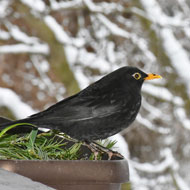Help garden birds survive cold snap, RSPB urges

Birds will be “desperately searching for food, water and shelter to survive”.
Plunging temperatures in the UK this week could spell disaster for garden birds, the RSPB is warning, as it urges the public to help by providing food and shelter.
The Met Office is forecasting ‘exceptionally cold’ weather across much of the UK this week, as the ‘Beast from the East’ brings icy winds and heavy snow from Russia.
Birds will struggle to cope with the cold snap after milder weather in January, which saw temperatures reach 15ºC in parts of southern England. It comes at a critical time, as birds need extra energy for finding mates and building nests.
Claire Thomas, RSPB wildlife advisor, said birds will be “desperately searching for food, water and shelter to survive”. However, members of the public can make a “real difference” to garden birds, improving their chances of surviving the freezing temperatures and making it to breeding season, she added.
The organisation is calling on people to provide a variety of sustenance, particularly fatty foods. Examples include fat balls or homemade bird cakes, which are cheap to make using kitchen scraps and lard and only take a few minutes. Seeds, fruits and dried mealworms are also favoured snacks among birds.
Fresh water for drinking and bathing is essential but this may be difficult for birds to find after a frost. To keep water sources ice-free, float a small ball on the surface of the water. Finally, put up a nest box to give birds somewhere to roost and shelter from harsh weather.



 The Veterinary Medicines Directorate (VMD) is inviting applications from veterinary students to attend a one-week extramural studies (EMS) placement in July 2026.
The Veterinary Medicines Directorate (VMD) is inviting applications from veterinary students to attend a one-week extramural studies (EMS) placement in July 2026.